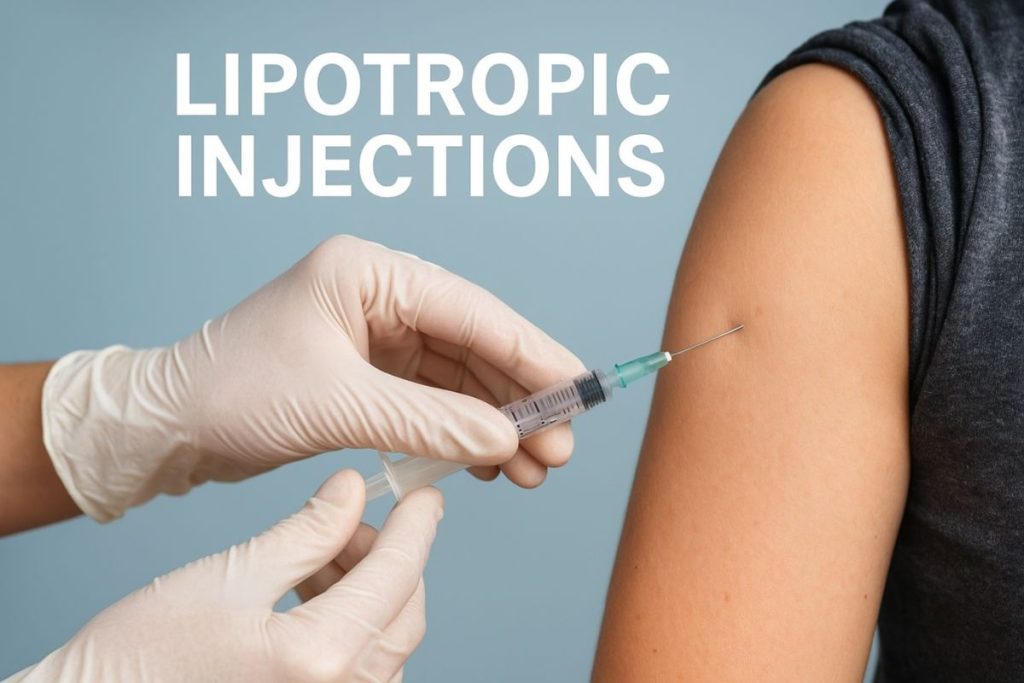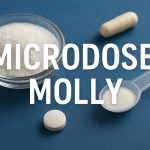Lipotropic injections often called “lipo shots” or “skinny shots” are nutrient blends injected into the body to support weight loss. These shots contain vitamins and nutrients (typically vitamin B12 plus fat-burning compounds) that some believe can boost metabolism and help burn fat. For example, a 2024 Healthline review notes that lipotropic shots are used as a supplement for fat loss alongside diet and exercise.
Proponents say that by directly delivering these nutrients (e.g. B12, choline, carnitine) via a syringe into muscle or fat tissue, the body may more efficiently process and remove fat deposits. However, evidence is limited: no major studies conclusively prove that lipotropic injections by themselves cause significant weight loss.
In this guide we’ll explain what lipotropic injections are, their key ingredients, potential benefits and risks, how they’re dosed, and what they cost. You’ll also learn best practices (diet, exercise) and FAQs to help you decide if these “fat-burning” shots are right for you.
What Are Lipotropic Injections?
Lipotropic injections are injections of lipotropic agents compounds that help the body break down and remove fat usually given along with vitamins. In practice, a typical lipotropic shot is a mixture of fat-fighting nutrients such as vitamin B12, the amino acids methionine and L-carnitine, and other compounds like choline and inositol. (Because they “carry away fat,” these compounds are called lipotropes.)
Providers may also add B vitamins, minerals, or other amino acids to the mix. As PrimeHealthMD explains, lipotropic injections are “a blend of essential nutrients” (methionine, inositol, choline, B12, and other B vitamins) intended to support metabolism and weight loss. Some clinics brand these as MIC injections (Methionine, Inositol, Choline plus B12) or Lipo-B shots.
Unlike oral supplements, lipotropic ingredients injected intramuscularly bypass digestion and enter the bloodstream directly. In theory, this faster delivery could give the body a quick boost of vitamins and amino acids to accelerate fat metabolism, increase energy, and support liver function. For example, in a typical lipotropic blend, vitamin B12 is included to improve energy and metabolic function, while choline and inositol help the liver process and eliminate fat. Methionine assists in mobilizing fat stores, and L-carnitine (often included) helps shuttle fatty acids into mitochondria for energy burn.
These shots are not drugs but nutrient supplements in the U.S. they are not FDA-approved weight-loss drugs, and their ingredients are only as safe as dietary supplements. Clinics marketing lipo shots emphasize they complement diet and exercise: as one aesthetic clinic notes, lipotropic injections “work with the body to eliminate unwanted fat” when combined with a healthy lifestyle.
In summary, lipotropic injections are nutrient injections aimed at aiding fat metabolism. They usually contain vitamin B12 (often the base), plus a mix of liver-supporting and fat-breaking nutrients. People often ask “what is a lipotropic injection?” or “what are lipotropic injections?” the answer is simply: an intramuscular shot of vitamins and amino acids used alongside diet/exercise to support weight loss. (If you’re searching online, providers often call them lipo shots, B12 injection, or lipotropics for weight loss.)
Key Ingredients in Lipotropic Injections
Most lipotropic shot formulas include the following ingredients:
- Vitamin B12 (Cobalamin): The main component in many lipotropic shots. B12 is essential for energy production and metabolism. It helps the body convert food into usable energy. B12 injections can combat fatigue and may speed up metabolism, especially in those who are deficient.
- Methionine: An essential amino acid that aids fat breakdown. Methionine helps mobilize abnormal fat deposits and supports liver function.
- Inositol: A vitamin-like substance (sometimes called vitamin B8) that supports hormone regulation. It helps regulate insulin and appetite signals. Inositol (the “I” in “MIC”) may reduce cravings and help control blood sugar, indirectly aiding weight management.
- Choline: A nutrient that helps metabolize fats. Choline (the “C” in “MIC”) works with the liver to process and remove fat. It also supports brain and nerve function. By helping flush fat out of liver cells, choline may reduce liver fat accumulation and speed metabolism.
- L-Carnitine: Often added to lipo shots, L-carnitine is involved in transporting fatty acids into mitochondria for burning. The NIH notes that carnitine may play a small role in weight loss when combined with exercise. Injections deliver carnitine more effectively than pills.
- Others: Some formulas include biotin, folate (B9), B6, magnesium, or pantothenic acid all nutrients involved in energy metabolism. Each addition is supposed to “round out” the metabolic support, though evidence for each varies.
Many of these ingredients are found in food. For instance, methionine is in eggs and fish, inositol in nuts and fruits, and choline in liver and peanuts. The idea is that injections give you a purified, concentrated boost of these nutrients (minus the calories) to ramp up fat processing. In short, lipotropic shots deliver a cocktail of fat-burning nutrients directly into the body.
How Lipotropic Injections Work
Lipotropic injections are marketed to enhance the body’s natural fat-burning processes. The shot is usually given intramuscularly (e.g. buttock or thigh injection, similar to a flu shot). Once injected, the nutrients enter the bloodstream and are available immediately, bypassing the slower digestive route. In theory, this direct route allows your body to quickly use these ingredients to accelerate metabolism. For example, B12 from the shot goes directly to cells that need it, potentially increasing ATP (energy) production. Choline and inositol travel to the liver to help dissolve and transport fats.
As one clinic explains, lipo shots “provide a direct boost to the body’s fat-burning processes… bypassing the digestive system for faster absorption”. When taken consistently (often weekly), the idea is your metabolism stays higher so you burn more calories and fat even at rest. Additionally, the energy boost from B vitamins can help you feel more active, which may lead to more exercise (and thus more fat burning).
However, it’s important to stress that lipotropic shots alone are not magic. They work in conjunction with diet and exercise. The health experts at Healthline and Medical News Today warn that any weight loss likely comes from overall lifestyle changes exercise and calorie reduction not the injections alone. In fact, one FAQ from Healthline points out: though some claim “up to 4 lb in a week” with lipotropic shots, no research confirms any specific amount of weight loss.
On the positive side, some individual ingredients in shots have shown small benefits. For example, the NIH notes that carnitine supplementation might slightly improve weight loss when paired with exercise. Likewise, a new study found that people with lower B12 levels tended to have higher body weight and more fat. Thus, correcting a B12 deficiency might help with energy and metabolism. (Indeed, B12 shots are known to quickly raise energy levels in deficient people.) But these effects are indirect: injections may help the body “work better,” rather than directly melting fat.
In summary, lipotropic shots aim to optimize your metabolism and liver function. They may give you more energy and help flush fat through the liver, which could aid your weight loss program. But to actually lose weight you still need a calorie-controlled diet and exercise. As Healthline notes: “If you do lose some weight while receiving lipotropic injections, this is likely due to other factors in your weight loss program — like exercise and diet — than to the shots alone.”.
Benefits of Lipotropic Injections
Advocates of lipotropic injections tout several potential benefits. These include:
- Enhanced Fat Metabolism: Lipotropic injections contain nutrients (like choline and methionine) that help the liver break down and export fat. By stimulating production of compounds like lecithin, they may reduce fat buildup in the body. Clinics claim this leads to “more efficient calorie burning” and easier fat loss. (For example, Square One Aesthetics notes that lipotropic nutrients “help stimulate the production of lecithin in the liver, which reduces fat buildup”.)
- Increased Energy Levels: Because B vitamins like B12 are vital for cellular energy, shots often make people feel more energetic. Many users report feeling less fatigued during a weight-loss program. One clinic highlights that “Vitamin B12… plays a role in fat and carbohydrate metabolism” and that B12 in lipo shots “enhances energy levels”. In practice, when patients feel more energetic, they may exercise harder and burn more calories.
- Liver Support & Detox: The liver is key to metabolism and detoxification. Lipotropics (as the name suggests) specifically target liver fat. By helping the liver clear out excess fat, these shots could improve liver function. Providers say a healthier liver leads to better digestion and metabolism. (For instance, one source explains that lipo shots “help remove excess fat from the liver, allowing it to function more effectively,” which can reduce bloating and aid weight management.)
- Appetite Control: Some lipotropics like inositol may help regulate hunger signals. Inositol helps stabilize insulin and hormonal balance, which may reduce cravings. If injections make it easier to stick to a calorie-controlled diet by blunting hunger, that indirectly aids weight loss.
- Holistic Weight Loss Support: Importantly, clinics stress that lipotropic injections are not a standalone cure. They are meant to be part of a comprehensive approach. Many patients find that combining shots with diet, exercise, and other healthy habits breaks weight-loss plateaus. As Square One notes, lipotropic shots support a holistic plan and help patients reach goals more efficiently.
It’s worth noting that some of these benefits come from patient reports and clinic testimonials, not randomized trials. Scientific evidence is sparse. However, there is a logical basis: for example, correcting a nutrient deficiency can improve your metabolism. A 2023 study found that children and adults with low vitamin B12 tended to have worse metabolic health (higher fat mass and liver steatosis). By boosting B12 via injection, you might reverse some of those issues. Similarly, an adequate supply of choline and methionine is known to keep the liver healthy in nutrition science.
In practice, many people taking lipotropic shots report feeling more motivated and energetic, which can be valuable during weight loss. The nutrient boost can also fill any gaps left by a restrictive diet. But it’s crucial to remember: the best way to lose fat remains a calorie deficit and consistent exercise. Lipotropic shots may aid that effort, but they won’t melt pounds on their own. In fact, experts from Medical News Today sum it up: lipotropic injections are not a substitute for healthy habits like diet and exercise. They are simply one tool in a larger toolbox.
Dosage & Administration
There are no FDA-approved standard dosages for lipotropic injections. Different clinics use different formulations and schedules, since these products are treated as nutritional supplements, not regulated drugs. Typically, lipotropic shots are given by a healthcare provider (e.g. nurse or doctor) in a clinic or medical spa. They are usually injected intramuscularly (into a muscle like the buttock or upper arm), though some ingredients could be given subcutaneously.
Common practices reported by clinics include:
- Frequency: Many programs recommend weekly injections in the beginning, then tapering to biweekly or monthly. For example, one source notes most patients get injections weekly until weight-loss goals are met. Some clinics might dose more often (2-3 times per week), while others less often.
- Duration: A typical course might last several weeks to a few months. Some people get a “loading” phase of 4-6 shots (one per week), then maintenance shots. Actual protocols vary widely.
- Amount: The exact amount of each ingredient in a shot depends on the clinic’s recipe. For instance, one study gave participants an intramuscular injection of 1,000 micrograms of B12 to test weight-loss effects. Other places might use 500 μg or 5,000 μg of B12. The amounts of choline, methionine, etc. are usually proprietary.
- Customization: Providers often tailor doses to the individual’s needs (age, weight, deficiencies). They may do blood tests (e.g. B12 levels) first.
In short, follow your practitioner’s advice on dosage. Because supplements aren’t tightly controlled, it’s wise to start with a clinic you trust. Some people like to combine lipotropic shots with regular vitamin B12 shots (if they have deficiency symptoms). If your injection contains B12, expect the typical B12 dose ranges: usually up to 1 mg per injection (1,000 μg) is common, but some use higher.
Citations: No universal guideline exists, so most clinics base dosing on anecdote and patient feedback. As Medical News Today notes, “clinics may follow different protocols” some once weekly, some more frequently. The takeaway is that dosage and frequency should be guided by a professional, not by guesswork or internet advice.
Side Effects of Lipotropic Injections
Lipotropic injections are generally considered low-risk when given by a qualified provider, but side effects can occur. Many reported effects come from the ingredients (especially B12) or the injection itself:
- Injection-site reactions: Pain, redness, swelling, or bruising at the injection spot are common. This is similar to any intramuscular shot. Keeping the site clean and rotating injection spots can help.
- Minor systemic effects (from B vitamins): B12 injections in large doses can cause mild side effects such as diarrhea, itching, dizziness, nausea, headaches, or hot flashes. Most of these are mild and go away quickly. If you experience severe stomach upset or dizziness, inform your provider.
- Allergic reactions: Rarely, someone could be allergic to an ingredient (like B12 or cobalt in some B12 formulations). Signs include rash, hives, itching, or even anaphylaxis (severe breathing difficulty). While very unusual, any sign of allergy after a shot should prompt immediate medical care.
- Nerve or tissue irritation: If a shot is injected incorrectly, you might feel nerve pain or tissue irritation. This could cause a burning or shooting pain that lasts minutes to hours. Usually it resolves on its own, but a different technique might be needed next time.
- Rare complications (fat-dissolving vs. lipotropic): It’s important to distinguish lipotropic (nutrient) shots from unapproved lipolysis injections (fat-dissolving chemicals). The FDA warns that non-FDA-approved fat-melting injections (like phosphatidylcholine or deoxycholate) can cause serious harm. One case report described a patient who got fat-dissolving injections and developed severe hard nodules and skin inflammation that required surgery. Traditional lipotropic shots (B12/methionine/etc.) have not been shown to cause such extreme effects. Still, use only injections vetted by a medical professional.
In one documented case, a woman receiving choline injections (a lipotrope) developed severely inflamed, painful nodules in the treated areas. This is very unusual, but it shows that even “nutrient” injections can sometimes cause local tissue reactions. More commonly, Healthline notes that injected lipotropic agents (especially unregulated mixtures) could lead to pain, infection, or cysts. Most providers will advise you to stop or switch formulas if you notice any odd lumps or lasting pain.
In summary, side effects are typically mild: injection site soreness and minor GI or neurological symptoms from the vitamins. Serious events are rare but possible, especially if injections are not done properly. Always discuss risks with your provider. If you feel any severe symptoms (severe pain, hard lumps, allergic signs), stop the shots and see a doctor.
Cost of Lipotropic Injections
The cost for lipotropic shots can vary widely. There is no standard price because these are offered by private clinics, and formulations differ. However, anecdotal reports and clinic pricing give a general range:
- Per-shot cost: Many weight-loss clinics charge about $35 to $75 per injection. Some report even higher, especially if the injection has extra ingredients. For example, Healthline cites online reports in this range.
- Packages vs. single shots: Some clinics sell individual shots, while others bundle them into packages or weight-loss programs. If you enroll in a program, your cost per shot might be lower, but you may need to commit to a block of weeks.
- B12-only shots: If you only get a B12 injection (no lipotropes), those tend to be cheaper (often under $20). Full lipotropic cocktails with multiple nutrients usually cost more. Medical News Today notes that the components included can influence price, and B12 alone is relatively inexpensive.
- Insurance coverage: Typically, insurance does not cover lipotropic injections for weight loss, as they are not FDA-approved treatments. Some insurers may cover vitamin B12 injections if you have a diagnosed deficiency (e.g. pernicious anemia), but not for “cosmetic” weight loss purposes. If your doctor somehow classifies it as a medical need, you might try billing it but most people pay out-of-pocket.
- Financing and discounts: Some clinics offer financing plans or monthly memberships to reduce upfront cost. It never hurts to ask for a self-pay discount or promotions.
Because there’s no universal pricing, shop around. If price is a concern, ask different providers for their B12 shot rates vs. lipotropic mix rates. Keep in mind the quality and reputation of the clinic a very cheap shot might skimp on ingredients or sterility. It’s a good idea to get a detailed cost quote before starting, including any hidden fees.
Lipotropic Injections for Weight Loss
Lipotropic injections are primarily used by people looking to lose weight or burn fat. The intended goal is to complement dieting and exercise, not replace them. Many users report weight loss and inches off their waist, but remember these reports are anecdotal. Scientific trials are scarce. So far, no study has definitively proved how much weight someone can lose from lipotropic shots alone.
Clinics often market the shots as “fat-melting” or “metabolism-boosting.” For example, one source says lipo shots help people “see better results” from their weight loss efforts. If you include lipotropic injections in your weight loss plan, you should treat them as one part of a healthy lifestyle. That means:
- Caloric control: Aim for a moderate daily calorie deficit. The CDC suggests cutting about 500 calories per day to lose 1–2 pounds per week. Adjust based on your age, sex, and activity level.
- Balanced diet: Fill your plate with lean proteins, whole grains, fruits, and vegetables. Reduce added sugars and saturated fats. Lipotropic shots do not grant permission to eat poorly they work best when combined with nutritious food choices.
- Regular exercise: Combine cardio (150 minutes moderate or 75 minutes intense per week) with strength training 2+ days a week. More activity boosts metabolism naturally.
- Other habits: Sleep (7–9 hours/night), hydration, and stress management all affect weight. If you stop exercise after injections, you’ll likely regain weight.
Remember that sustainable weight loss comes gradually. Crash diets often fail and can be unhealthy. Instead of seeking quick fixes, use lipotropic injections as a supplemental tool. Some patients do see a difference; for instance, clinics sometimes show before-and-after pictures of clients after 4–6 weeks of shots (often with lifestyle changes). However, individual results vary. Healthline cautions that success is “limited research,” meaning you shouldn’t expect guaranteed dramatic results.
If you decide to try lipotropic therapy, track your progress carefully. Weigh yourself or use body measurements once a week, and take photos (with the same lighting, clothes, etc.) so you can objectively see changes. This will help you determine if the injections are making a difference in conjunction with your diet and exercise.
Lipotropic Injections: Before and After, Reviews
Because lipotropic injections have become trendy in some weight-loss circles, you’ll find many online reviews and testimonials. Before-and-after photos are common on social media and clinic websites: people show week 0 vs week 4 or 8 to highlight lost inches. However, be cautious: these are not verified clinical studies. They might reflect the combined effects of injection, diet, exercise, and placebo.
Generally, user reviews fall into two camps:
- Positive reviews: Many users report increased energy, improved mood, and modest weight loss or inch loss. Some say they overcame plateaus when food intake and workouts were the same as before. Increased motivation and adherence to diet are often cited benefits. People on B12 injections often feel immediately more energized, which might lead to better workouts.
- Skeptical reviews: Others report no significant change at all. Some people see water weight loss initially, which then stalls. A few even feel no energy boost. Common criticism is that shots are “expensive vitamins” and that diet/exercise were the real reason for any weight drop.
In summary, results vary. A 1-month course might show a few extra pounds lost for some, and nothing for others. There’s no firm timeline: some say they noticed changes in 2–4 weeks, others require months. If you look up “1 month lipotropic injections results pictures,” you’ll see sensational examples but remember, real world results depend on many factors.
If you choose to try these injections, consider them an “experiment” rather than a sure-fire solution. Monitor your results, and always combine shots with good diet/exercise. And if you stop the shots, you should maintain your healthy habits to prevent rebound weight gain.
Finding a Provider (Lipotropic Injections Near Me)
Lipotropic injections are usually offered in weight-loss clinics, medical spas, and sometimes IV therapy centers. If you’re interested, start by searching online for “lipotropic injections near me” or “B12 lipotropic injections near me”. This will help you locate local medspas and providers who advertise these shots. Many doctors and nurses specializing in weight management include lipo shots among their services.
When evaluating providers, check qualifications. Ideally, a physician or licensed nurse with training in weight-management should administer the injections. Some spas are reputable, but be wary of uncertified technicians or dubious “fat meltdown” packages. You can also ask friends or read online reviews of clinics in your area.
Before booking, ask the provider about their specific formulation and follow-up plan. A good clinic will customize the mix and dose for you, not just inject a generic cocktail. They should also discuss risks, tell you what to expect, and monitor your response. If you have medical conditions or take medications, make sure the provider reviews those first, as some combinations could be contraindicated.
Remember: these injections are a medical service. Don’t sacrifice safety for convenience or cost. It’s better to drive a bit further or pay a bit more to see a qualified practitioner.
Frequently Asked Questions (FAQs)
What are lipotropic injections used for?
Lipotropic injections are primarily used to support weight loss and fat metabolism. They deliver nutrients (like B12, choline, carnitine) to help your body break down fat more efficiently. People use them as part of a weight-loss plan alongside diet and exercise. Some also use them to boost energy or correct vitamin deficiencies.
Do lipotropic injections actually help you lose weight?
Possibly, but they are not a magic cure. No large studies prove a definitive weight-loss effect. Any fat loss is usually attributed to the overall program (diet/exercise) rather than the shots alone. Some small studies and expert opinions suggest ingredients like carnitine and B12 could assist metabolism. In practice, some individuals report faster weight loss or improved energy while on shots, but results vary widely.
What are the side effects of lipotropic injections?
Most side effects are mild and from injection-site irritation or B vitamins. You might experience temporary pain, redness, or swelling where the needle went in. Common side effects of B12 injections (often part of the mix) include mild diarrhea, nausea, dizziness, headache, or itching. Serious allergies are very rare. If injections include fats or hormones (which good lipotropics usually do not), other side effects could occur. Always discuss potential risks with your provider beforehand.
How often should I get lipotropic injections, and what dosage?
There’s no one-size-fits-all dosage. Clinics often start with a shot once per week for several weeks, then adjust based on your results. The exact amount of each ingredient depends on the formula. Some clinics use 1,000 μg of B12 per shot as a starting point. Your provider will recommend a schedule based on your weight-loss goals, lab results, and tolerance. Always follow the prescribed plan rather than DIY dosing.
How much do lipotropic injections cost? Are they covered by insurance?
Typically, injections cost $30–$70 per shot. Prices vary by clinic and ingredients. Some places offer packages or membership discounts. Insurance usually does not cover lipotropic shots for weight loss, since they are considered elective supplements. You may only get coverage if you have a specific medical deficiency (like severe B12 anemia) and a doctor codes it that way. Be prepared to pay out-of-pocket, and ask the clinic about payment plans or bundled rates.
What is the difference between a B12 injection and a lipotropic injection?
A B12 shot contains only vitamin B12 (cyanocobalamin or methylcobalamin), usually given to treat B12 deficiency. Lipotropic injections always include B12 but add other fat-burning ingredients (methionine, inositol, choline, etc.). You can think of a lipotropic shot as a “supercharged” B12 shot. If you only need B12, a simple B12 injection is cheaper; if you want the extra nutrients for weight-loss support, you’d choose a lipotropic formula.
How long until I see results?
Everyone’s timeline differs. Some people feel an energy boost within days of the first shot. Actual weight or fat loss might take a few weeks. Clinics often show 4-week or 6-week before-and-after photos. Realistically, expect that any weight loss will be gradual maybe a few pounds in a month if your diet and exercise are solid. Don’t expect immediate miracles. Track your progress in writing or photos each week. If after 4–8 weeks you see no change despite sticking to your plan, consult your provider; the shots may not be helping and could be paused.
Is it safe to do lipotropic injections?
When performed by a qualified healthcare provider, lipotropic injections are generally safe. The ingredients are mostly vitamins and amino acids. However, as with any injection, there are risks of infection or improper administration. There have been isolated reports of severe reactions (e.g. hard nodules, inflammation) if injections are done incorrectly or with unusual compounds. To stay safe: go to a licensed clinician, ensure supplies are sterile, and disclose any allergies or health issues to your provider.
Where can I find lipotropic injections near me?
Search for “lipotropic injections near me” or “B12 weight loss shots” in your city. Many doctors’ offices, medical spas, and weight-loss clinics advertise these services. For example, some primary care practices and aesthetic clinics offer MIC/B12 injections. Always choose a reputable place read local reviews or get referrals. You can also ask if your current doctor offers vitamin shot services.
Are there before/after pictures or reviews I can see?
Many clinics showcase patient photos and testimonials. These are easy to find with an online search (e.g. “lipotropic injections before and after”). Keep in mind such images are promotional. They may help set expectations, but remember that individual results vary. For balanced views, look for forum discussions or third-party reviews about “lipotropic injections reviews.” Hearing others’ experiences can be informative, but always remember your own results will depend on your unique diet and exercise routine.
Conclusion
Lipotropic injections are a popular adjunct for weight loss, combining vitamin B12 with fat-burning nutrients to potentially boost metabolism and energy. Research on their effectiveness is limited, but they are generally safe when administered properly. Many people find them helpful as a complimentary tool often noting improved energy and motivation, which can aid diet and exercise efforts. Key takeaways: always consult a qualified provider before starting lipo shots, follow a solid nutrition/exercise plan, and remember that no shot can replace healthy habits. Any weight lost is likely due to your overall regimen rather than the injections alone.
If you’re considering lipotropic therapy, weigh the costs ($30–$70 per shot) and potential benefits. Watch for side effects (mostly mild) and stop if you notice concerning symptoms. After treatment, maintain good habits or risk regaining weight.
Have you tried lipotropic injections? Share your experience or questions in the comments below! Your feedback helps others learn. If you found this guide helpful, consider sharing it on social media or with a friend looking to lose weight. Always remember: sustainable weight loss comes from consistent, healthy lifestyle changes and supplements should only play a supporting role.
Sources: Information in this guide is based on medical reviews and studies. Always consult healthcare professionals and current clinical guidelines for personalized advice.






